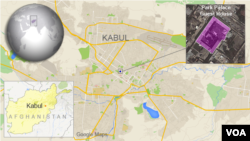Afghanistan’s intelligence agency says it has arrested two of the alleged organizers and planners of a deadly attack on a Kabul guesthouse that killed 14, including nine foreigners.
The Afghan National Directorate of Security issued a statement Wednesday that Ghulam Aziz (aka Salahuddin) and Abdul Wakil, a member of Kabul-based NGO Madeera, are part of the Haqqani network.
The network is considered one of the deadliest groups in the Afghan Taliban ranks. Afghanistan has in the past blamed neighboring Pakistan for providing it safe havens.
The Afghan NDS also charges the planning for last month’s attack “took place under the supervision of a Haqqani network commander, Qari Abdullah (aka Anass) in Peshawar,” a northern Pakistani city.
Explaining how the plan worked, the NDS statement says Aziz obtained a fake USAID identity card as well as a map of the Park Palace guesthouse that he forwarded to Abdullah.
The Haqqani network then sent an attacker known as “Edriss” to Kabul. Aziz and Wakil helped him enter the guesthouse to launch the fatal attack.
“We have not been in touch with the Pakistani authorities yet,” NDS spokesman Abdul Hassib Sideqi said.
Sideqi added the case is being investigated solely by the NDS, even though the agency recently signed a memorandum of understanding with Pakistan’s intelligence agency, ISI, for intelligence sharing and jointly investigating terrorism suspects. But, “The practical part of the cooperation between the two services has yet to be defined,” he pointed out.
The two men arrested are also suspected in attacks on the Ministry of Interior and the police headquarters in Logar province, and Aziz is believed to have been working on planning for a suicide attack in Massoud Square in Kabul.
The relationship and security cooperation between Afghanistan and Pakistan have significantly improved since the Afghan unity government of President Ashraf Ghani and Chief Executive Abdullah Abdullah took office. The previous administration of President Hamid Karzai often blamed Pakistan for providing sanctuaries and safe havens to militants who carried out attacks in Afghanistan.
The two countries have toned down their rhetoric against each other and voiced support for each other’s fight against extremism and militancy. The current administration, particularly President Ghani, has made it clear he thinks a better relationship with Pakistan is essential for improving security and the economy in Afghanistan.
Visiting Kabul last month, Pakistani Prime Minister Nawaz Sharif condemned the Afghan Taliban’s spring offensive and promised action against anyone who attacks Afghanistan. “Any effort by any militant or group to destabilize Afghanistan will be dealt with severely, and such elements will be outlawed and hunted down,” Sharif said.
Afghanistan Arrests Suspects in Kabul Guesthouse Attack

ISLAMABAD —



